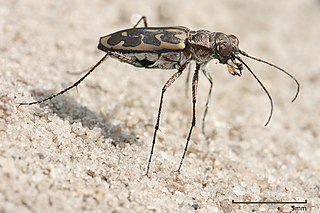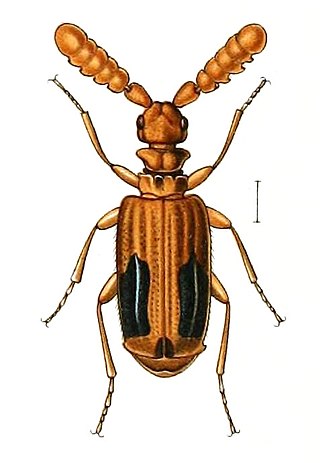
Tiger beetles are a family of beetles, Cicindelidae, known for their aggressive predatory habits and running speed. The fastest known species of tiger beetle, Rivacindela hudsoni, can run at a speed of 9 km/h, or about 125 body lengths per second. As of 2005, about 2,600 species and subspecies were known, with the richest diversity in the Oriental (Indo-Malayan) region, followed by the Neotropics. While historically treated as a subfamily of ground beetles (Carabidae) under the name Cicindelinae, several studies since 2020 indicated that they should be treated as a family, the Cicindelidae, which are a sister group to Carabidae within the Adephaga.

Ground beetles are a large, cosmopolitan family of beetles, the Carabidae, with more than 40,000 species worldwide, around 2,000 of which are found in North America and 2,700 in Europe. As of 2015, it is one of the 10 most species-rich animal families. They belong to the Adephaga. Members of the family are primarily carnivorous, but some members are herbivorous or omnivorous.

The Adephaga are a suborder of beetles, and with more than 40,000 recorded species in 10 families, the second-largest of the four beetle suborders. Members of this suborder are collectively known as adephagans. The largest family is Carabidae which comprises most of the suborder with over 40,000 species. Adephaga also includes a variety of aquatic beetles, such as predaceous diving beetles and whirligig beetles.

Mecodema is a genus of large flightless ground beetle (Carabidae) endemic to New Zealand. The genus is very diverse in comparison to the other three New Zealand genera within the subtribe Nothobroscina. Mecodema is geographically widespread across both the North and South Islands, as well as numerous offshore islands, including the Three Kings Is., Poor Knights Is., Aotea and Hauturu, Kapiti Is., Stephens Is., Stewart Is., Chatham Is., Snares Is.

Walther Hermann Richard Horn was a German physician and entomologist who specialised in beetles (Coleoptera), particularly the tiger beetles. He became the founding director of the German entomological institute where he collaborated with entomologists around the world. He is not to be confused with the American entomologist George Henry Horn who also studied Coleoptera.

Zabrus is a genus of ground beetles. They are, unusually for ground beetles, omnivores or even herbivores, and Zabrus tenebrioides can become a pest in cereal fields.

Kenyacus is a genus of beetles in the family Carabidae first described by Charles Alluaud in 1917.
Dercylus is a genus in the beetle family Carabidae. There are more than 30 described species in Dercylus, found primarily in Mexico, Central America, and South America.

Melanospilus is a genus of flanged-bombardier beetles or paussines in the family Carabidae, containing the following species: The genus is considered to belong to the subtribe Ceratoderina and all members are thought to be myrmecophiles. The ant host Paratrechina longicornis is known for M. bensoni.

Protopaussus is a genus of ground beetles in the family Carabidae, the sole genus of the tribe Protopaussini. It is found in Indomalaya and temperate Asia.
Altagonum is a genus of beetles in the family Carabidae, containing the following species:

Tasmanitachoides is a genus of ground beetles in the family Carabidae, endemic to Australia. The beetles are very small, typically 1.5 to 3.0 mm. in length, and live in coarse sand or fine gravel along freshwater shorelines throughout Australia.

Oodini is a ground beetle tribe in the subfamily Harpalinae. Oodines are found worldwide and are generally associated with standing water. This tribe contains more than 400 species arrayed in 43 genera. Beetles in Oodini are distinguishable from other members of Carabidae by a combination of two characters: a laterally coadunate metepisternum, and an elytral ridge formed by the fusion of intervals 7 and 8.
Roger Naviaux was a French entomologist known for his work on beetles.

Ross Taylor Bell was an American entomologist with particular interest in the invertebrate natural history of Vermont, United States, and carabid beetles. Together with his wife, Joyce Rockenbach Bell, his work at the University of Vermont was largely taxonomic, where they described more than 75% of the rhysodine species known to science. Ross also wrote a number of seminal papers in his chosen field.
Abacetini was formerly a tribe of ground beetles in the family Carabidae, but is now considered the subtribe Abacetina of the tribe Pterostichini in the same family.

Megacephalini is a tribe of big-headed tiger beetles in the family Cicindelidae.
Jules Antoine Adolphe Henri Putzeys was a Belgian magistrate and an entomologist who took a special interest in the beetles belonging to the family Carabidae.
Omophron aequale is a species of ground beetle in the family Carabidae. It is distributed in East Asia.












